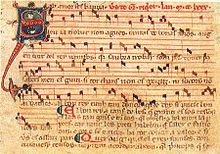- Guiraut Riquier
-
Guiraut Riquier, né vers 1230 à Narbonne (Aude) et mort vers la fin du XIIIe siècle, est considéré comme l'un des derniers troubadours occitans[1]. À la poésie lyrique d'essence amoureuse (fine amor) ou politique, il préfère une poésie plus religieuse. La dame profane célébrée par les troubadours devient chez lui la Vierge Marie.
Il est connu pour un partimen, un débat poétique, qu'il eut avec Bonfils, Auzit ay dir, Bofil, que saps trobar ("J'ai entendu dire, Bonfils, que tu savais composer"), mais aussi pour son soin de la conservation de ses propres œuvres.Biographie
Il a fréquenté les cours de personnages importants qui accueillaient encore les troubadours. Il a donc travaillé pour le Vicomte Almaric IV de Narbonne, pour Alphonse X, roi de Castille et aussi pour le Comte Henri II de Rodez.
Œuvres
Ayant recueilli lui-même ses propres œuvres, on possède sans doute la collection complète de ses textes. On dénombre 106 pièces, dont 48 œuvres musicales[2]. Parmi ces œuvres, on dénombre 2 aubes, 26 chansons, 15 chansons religieuses, 1 chanson de croisade, 1 coblas, 1 descort, 6 pastourelles, 1 planh, 16 sirventès, dont trois chantés[3].
Notes et références
- Joseph Anglade, Grammaire de l'ancien provençal ou ancienne langue d'oc, 1921, Partie I, Ch. 1, p. 31 : [...] même le dernier troubadour, Guiraut Riquier, mort dans les dernières années du XIIIe siècle [...].
- Oxford Music Online, http://www.oxfordmusiconline.com/subscriber/article/grove/music/23510
- http://avecgildef.forumpro.fr/t703-guiraut-riquier-languedoc-etude-des-oeuvres#1466
Catégories :- Poète occitan
- Troubadour
- Naissance en 1230
- Date de décès inconnue (XIIIe siècle)
- Compositeur du Moyen Âge
Wikimedia Foundation. 2010.

